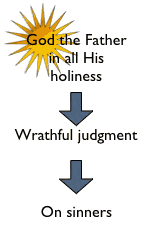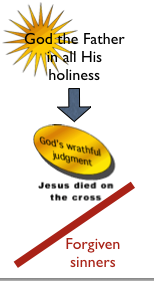

Key to Life
1 John 1:5-2:2
Paul J. Bucknell

1 John 1.5-2.2 The Key to Life provides for us the foundation for our spiritual life. 1 John 2:1-2 speak clearly how the holy God in His anger intervened by having His only Son Jesus Christ die for our sins as a complete and perfect sacrrifice by which all our terrible sins are cleansed.
C. How can I find help?
1 John 2:1-2
My little children, I am writing these things to you that you may not sin. And if anyone sins, we have an Advocate with the Father, Jesus Christ the righteous; 2 and He Himself is the propitiation for our sins; and not for ours only, but also for those of the whole world.
| A. What is God Really Like? (1 John 1:5) B. What do we really believe? (1 John 1:6-10) C. How can I find help? (1 John 2:1-2) Study Questions on 1 John 1:5-2:2 Introduction to 1 John Summary to 1 John 1:1-2:2 |
You might be wondering how you can find help. This is the right response. God is light. We can never perfectly reflect His holiness and therefore incur condemnation. When you know of a missile or hurricane coming, you take cover. But if you do not believe there is any threat, you will do nothing. Most people because they do not rightly think of God, do not think they need help regarding their sins. As John says again and again, they lie. They fool themselves. The truth will eventually reveal all falsehood. The Light will overcome all darkness. There is no place to hide from God’s wrath.
 But some people are very sensitive to their sins. They were not always this way. It is not a matter of intelligence but a matter of the Spirit. When God reveals Himself in His holy light, our darkness becomes ever so apparent. Our hearts are humbled. We tremble for the darkness that has exuded from our lives. If God is now prompting you by His Spirit about your sin, don’t shoo away the confused feelings. John wants us to know there is a way to deal with them.
But some people are very sensitive to their sins. They were not always this way. It is not a matter of intelligence but a matter of the Spirit. When God reveals Himself in His holy light, our darkness becomes ever so apparent. Our hearts are humbled. We tremble for the darkness that has exuded from our lives. If God is now prompting you by His Spirit about your sin, don’t shoo away the confused feelings. John wants us to know there is a way to deal with them.
The first time John highlights the purpose for his writing was in 1:4. He said, “We write so that our joy may be made complete.” John really knows about joy in life. The second time he refers to his purpose of writing is in 2:1. He says, “I am writing these things to you that you may not sin.”
The scriptures give us a model where everyone will be judged by the light that is given to them. Knowing God’s light is not salvation. It is being able to discern His righteous and holiness. The greater the light, the more the responsibility one will face to respond to that Light. Some people wish that they could see God’s light. But then they should ask themselves, if they do not respond rightly to the light that they have, then why should they be so bold to think that they would respond to the a greater light. The issue is not whether we love the light. The issue is whether we are truly seeking God or not.
Or see BFF's Resource Center for purchasing this low cost biblical training and discipleship resources. |
As long as we think about God the wrong way, we will sin and any potential joy will be stripped away from us. Sin’s pleasure are always short-lived. God’s joy is continuous and deep. We must ask where is there joy when you know God is going to judge you for every sin that you have. Like a special scanning machine God is going to review every thing you and I have ever done.
 All the excuses above are ways people escape their responsibilities. They are unwilling to face the light. It is only those who are seeking after God will not cover up their sin but seek a covering for their sin. This is what John is referring to in 1 John 2:1-2. “If anyone sins” certainly can describe any one of us. God has taken care of that need that He knew we would have.
All the excuses above are ways people escape their responsibilities. They are unwilling to face the light. It is only those who are seeking after God will not cover up their sin but seek a covering for their sin. This is what John is referring to in 1 John 2:1-2. “If anyone sins” certainly can describe any one of us. God has taken care of that need that He knew we would have.
John addresses them ‘my little children.’ His intention is to propel us toward God enough so that we see the need for help. I remember just before I was saved God showed me my own sin. Before that time I could always compare myself to others and think quite well of myself. Thoughts about God didn’t disturb me because I believed what I wanted about Him. But then when He revealed His holiness, my whole façade of righteousness fell apart in seconds like wax before a heat. It was here that God reminded me of the power of the Gospel of Jesus Christ. This is what John writes about here.
“And if anyone sins, we have an Advocate with the Father, Jesus Christ the righteous.” There is a lawyer, an Advocate, that God appointed for us that will actually intercede on our behalf. God wants us to be saved. He wants to help us. Then he reminds us that here Christ is the ‘propitiation for our sins.’ All those things that we did to incur God’s wrath were satisfied by Christ dying for our sins. Technically, this is called a substitutionary atonement. Christ’s death appeased God’s wrath that it would no longer exist toward us.
 This is where we see the love of God come in. We first need to know of God’s holiness before we can understand our dire position. It is in this most desperate situation, we find God is His gracious and awesome love sacrifice His one and only Son for us. If we deny our sin, then we will never seek for God’s provision for righteousness. We will not run after Christ, God’s great provision, but be content with our cheap attempt to satisfy our personal guilt. But if we understand that He is holy, absolutely holy, then we will find that all our attempts are no good. We have only one hope, only one savior, and that is Christ Jesus. You will not find such a Savior in any other religion. Only God’s love is shown in Christianity where God reached out on the behalf of sinners and sent His only Son to die as a peace sacrifice.
This is where we see the love of God come in. We first need to know of God’s holiness before we can understand our dire position. It is in this most desperate situation, we find God is His gracious and awesome love sacrifice His one and only Son for us. If we deny our sin, then we will never seek for God’s provision for righteousness. We will not run after Christ, God’s great provision, but be content with our cheap attempt to satisfy our personal guilt. But if we understand that He is holy, absolutely holy, then we will find that all our attempts are no good. We have only one hope, only one savior, and that is Christ Jesus. You will not find such a Savior in any other religion. Only God’s love is shown in Christianity where God reached out on the behalf of sinners and sent His only Son to die as a peace sacrifice.
Application. We must ask if we have a great appreciation of Jesus. If not, then we know little of our sin. Many people know of Christ in the mind but not in the heart. Perhaps this is because they have a poor view of their sin. They have a poor view of sin because they have a poor view of God.
May you turn away from all the cheap ways man tries to pacify his personal guilt. This guilt is only what we feel but the real guilt is for all the wrong that we have done. Perhaps you ask, “What does Jesus’ death have to do with propitiation?” Let me answer that. When Jesus bore our sins, He took on the true guilt. There was only one thing that this meant for Christ. God’s wrath would be cast upon Him instead of us, who from all around the world would believe in Him. It is either Christ who does for our sin or you yourself will die for you sin.
How great is the love of God for sinners! We could not ask God to do this. He in light of His holy person knew what judgment would come our way, interceded with the life of His only Son. Do you see how love follows light. Light always come first. The source of joy in the fellowship with His people comes from knowing that we have a great Savior who died for our sin. A great swelling of gratitude fills our heart as we think upon God’s love for us.
A Brief Discussion on the Perfect Atonement
Limited atonement teaches that Christ was a propitiation only for those in God’s family. Notice the ‘little children’ or ‘our’ that is mentioned in these two verses. Because the propitiation actually appeases God’s wrath, then it is only for those (therefore it is called limited) who believe. Others who espouse unlimited atonement believe that the atonement is a provision made for everyone. Christ died for all. Their real argument is philosophical. They do not see how there can be a general call to all if there is not provision for all. This in my point is not a point at all. It is what Christ is said to do that makes the difference. In this case they point out the phrase 'whole world.' We agree that the phrase is emphasized. The problem with applying it to every last person is that the context is explicit in making it for believers only. Christ, for example, is the Advocate only for the believer but not for all. It is for those who believe.
When the atonement is said to be for the world, then it is hard not to slide over to the viewpoint that 'God has forgiven all.' This of course is exactly opposite to what John has just written in making an exclusive fellowship (see chapter 1). We suggest the first interpretation which would have the sacrifice to be intended for those that would believe. The 'world' here refers to the believers throughout the world. God is not partial to the Jewish believers. Instead He has broadened the Word of God to bring faith to anyone who believes. If one is familiar with the Book of Acts, this theme is very familiar. We recognize that there is a variation of those who espouse unlimited atonement. They agree that this advocacy is effective to only those who believe but still believe Christ died for every last person. They think that Christ needed to die for all. We reject this. Christ's propitiation is fully satisfactory. If Christ has died for one, then God’s wrath for that one is appeased by Christ’s sacrifice.
Summary
The Key to Life gives us in summary a right approach to God. We will review the number of steps that are outlined in this passage.
· Get the message right.
· Respond to the light God gives you.
· Be careful for you will be tempted to avoid confrontation of your sin.
· Confess your sin and plead for help.
· Trust Jesus’ death to cover you from sin.
· Rejoice in the forgiveness that He gives.
· Respond by delighting in Him.
Check out the BFF NT Biblical Training Library! It holds an incredible amount of training materials including easy to view and print pdfs, powerpoints, audio mp3 and even videos. We allow you to copy. modify and distribute material for teaching or personal edification. You don't need to ask!
Or see BFF's Resource Center for purchasing this low cost biblical training and discipleship resources.










 OUR MEETING WITH GOD
OUR MEETING WITH GOD